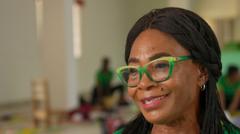In Lagos, Nigeria, Babatunde Fashola, a 22-year-old with cerebral palsy, remains under the loving care of the Cerebral Palsy Centre, founded by Nonye Nweke. Known affectionately as Baba, he stands at less than 70cm (2ft 4in) tall and relies entirely on others for his daily needs. Abandoned at birth, he has been at the centre for the past ten years, receiving round-the-clock support from Ms. Nweke and her dedicated staff.
Cerebral palsy is alarmingly prevalent, with a Nigerian professor estimating over 700,000 cases in the country, many linked to untreated neonatal jaundice—a condition affecting more than 60% of newborns. Jaundice occurs when bilirubin accumulates in the baby's blood, resulting in a yellowish skin tone. Although treatable through basic medical procedures, timely access to treatment remains a challenge in Nigeria, where the healthcare infrastructure is strained.
“For the best outcome, neonatal jaundice treatment must occur within the first ten days of life,” emphasizes Professor Chinyere Ezeaka from the Lagos University Teaching Hospital. If left untreated, it can lead to severe cerebral palsy and other neurological disorders, putting Nigeria among the highest nations for such conditions, reports the World Health Organization.
Responding to her own struggles, Ms. Nweke established the Cerebral Palsy Centre after facing difficulties finding appropriate care for her daughter Zimuzo, now 17. With a warm environment filled with toys and healthcare support, the centre serves a critical need in a country with scarce facilities—only three private centres exist to cater to the massive population of over 200 million.
While providing care to 12 children, Ms. Nweke faces ongoing challenges, as more than 100 families await assistance. The monthly cost to care for each child reaches at least $1,000, far exceeding the national minimum wage of $540 annually.
Despite the struggles, hope arises from initiatives like the Oscar Project, a charity focused on enhancing jaundice diagnosis and treatment in Lagos. Supported by health firm Reckitt, the project aims to equip local facilities and train hundreds of healthcare workers to reach thousands of mothers and significantly reduce disabilities caused by untreated jaundice in infants.
Inspired by Oscar Anderson, a UK advocate who suffered from untreated jaundice-related cerebral palsy, this project strives for a future where no child has to endure the pain of stunted development. As Mr. Anderson states, the objective remains robust: "The work doesn't stop until every baby is protected against neonatal jaundice."
In this crucial battle against cerebral palsy, advocacy, awareness, and community effort stand as the essential pillars guiding Nigeria toward a hopeful future for all children.
Cerebral palsy is alarmingly prevalent, with a Nigerian professor estimating over 700,000 cases in the country, many linked to untreated neonatal jaundice—a condition affecting more than 60% of newborns. Jaundice occurs when bilirubin accumulates in the baby's blood, resulting in a yellowish skin tone. Although treatable through basic medical procedures, timely access to treatment remains a challenge in Nigeria, where the healthcare infrastructure is strained.
“For the best outcome, neonatal jaundice treatment must occur within the first ten days of life,” emphasizes Professor Chinyere Ezeaka from the Lagos University Teaching Hospital. If left untreated, it can lead to severe cerebral palsy and other neurological disorders, putting Nigeria among the highest nations for such conditions, reports the World Health Organization.
Responding to her own struggles, Ms. Nweke established the Cerebral Palsy Centre after facing difficulties finding appropriate care for her daughter Zimuzo, now 17. With a warm environment filled with toys and healthcare support, the centre serves a critical need in a country with scarce facilities—only three private centres exist to cater to the massive population of over 200 million.
While providing care to 12 children, Ms. Nweke faces ongoing challenges, as more than 100 families await assistance. The monthly cost to care for each child reaches at least $1,000, far exceeding the national minimum wage of $540 annually.
Despite the struggles, hope arises from initiatives like the Oscar Project, a charity focused on enhancing jaundice diagnosis and treatment in Lagos. Supported by health firm Reckitt, the project aims to equip local facilities and train hundreds of healthcare workers to reach thousands of mothers and significantly reduce disabilities caused by untreated jaundice in infants.
Inspired by Oscar Anderson, a UK advocate who suffered from untreated jaundice-related cerebral palsy, this project strives for a future where no child has to endure the pain of stunted development. As Mr. Anderson states, the objective remains robust: "The work doesn't stop until every baby is protected against neonatal jaundice."
In this crucial battle against cerebral palsy, advocacy, awareness, and community effort stand as the essential pillars guiding Nigeria toward a hopeful future for all children.


















